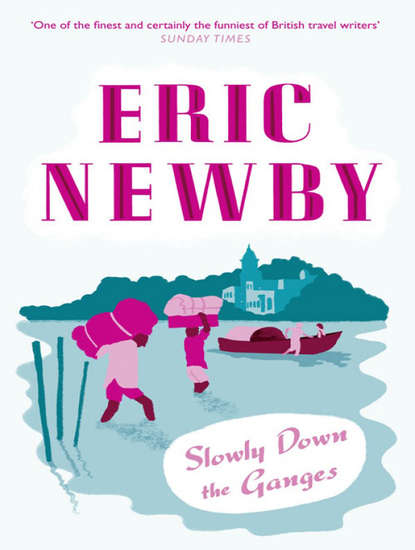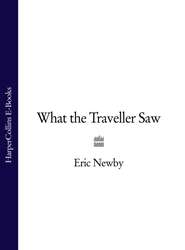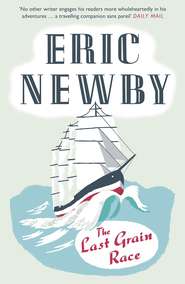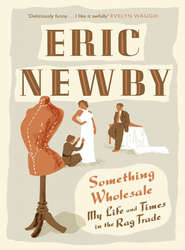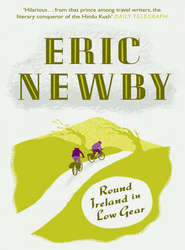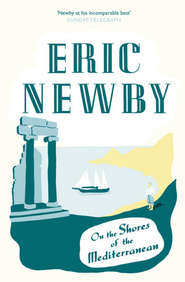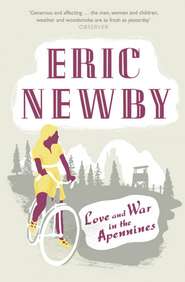По всем вопросам обращайтесь на: info@litportal.ru
(©) 2003-2024.
✖
Slowly Down the Ganges
Автор
Год написания книги
2018
Настройки чтения
Размер шрифта
Высота строк
Поля
We started to carry the gear a mile downstream to the place where the falls ended, through wastes of sand and stones that were now so hot that it was impossible to remain standing on them barefooted without dancing up and down. Bent under the weight of tin chests, oars and gratings, with hurricane lanterns held improbably in the crooks of our arms, we resembled the survivors of a shipwreck on the coast of Namaqualand, all except Wanda who, wearing a bathing costume of Helanca yarn, high wellington boots and her General’s hat on top of which she balanced a tin full of kerosene, was a fantastic figure, more like a drum-majorette in some Middle Western town than a memsahib on a serious excursion, and the boatmen regarded her with awe.
Suddenly, by the kind of miracle which all true travellers regard as inevitable and almost unworthy of remark, three men appeared. They were on their way to cut wood in the jungle, but when we asked them for help they said, as the others had, that their work was not with water. Nevertheless we pressed them into our service at a colossal wage of two rupees a head and although they were poor, emaciated, gentle creatures, with their unwilling help the boat began to move over the stones, making a noise like an old tram.
But it was only for a short while. At first the air resounded with encouraging cries. ‘Challo!’ (Oh, move!); ‘Shabash!’ (Well done!); ‘Aur thora!’ (A little more!) but in the face of the almost overwhelming difficulty of the operation, the noises soon died away and our efforts were concerted by a succession of unintelligible grunts. I could think of nothing but my bare feet, which, as I pressed them down on one rounded stone after another, felt as if they had been bastinadoed. I only possessed two pairs of shoes, one for social occasions and one for walking. The size and shape of my feet made it certain that, unless I was able to remain in one place long enough to have them made-to-measure, I would never find another pair however long I remained in India. I was very reluctant to ruin my shoes by using them underwater, but in the course of the next hour I was forced to put them on, for it took an hour to get the boat to the top of the fall. Even then it was not just a question of leaping into it or holding the gunwales and careering down as it had been previously. The water was too shallow. It was not until the boat was part way down the second rapid that it suddenly floated. It now gained such a momentum that it shot right through a large pool, over the top of the third fall and down it into a beautiful open reach. We had managed to transport some of the gear from the boat this far, but the rest was spread out in small dumps over a mile of beach, dropped at the whim of whoever had been carrying it, and while Wanda boiled the kettle for tea we went back to retrieve it.
We drank our tea and set off again. We were very tired. It was a beautiful river; but it was destroying us. Almost at once we heard the sound of more rapids. To our diseased imaginations they sounded like the Victoria Falls. We were hungry now. It was three o’clock. Since breakfast, a thin meal, we had eaten nothing except some hot, white radishes that Wanda had produced artfully from a mysterious-looking bag. Now she began to cook in a space which she cleared for herself in the bottom of the boat and when we finally came to the next rapids she refused to be off-loaded and separated from the stove. ‘If I stop cooking now we’ll never eat,’ she mumbled doggedly.
But this time there was no need for any of us to get out. There was a superabundance of water in these rapids and we went down at a terrific rate, clasping the seething cooking pots as if they were sacred relics. Safe at last we stopped to eat alongside an island that rose steeply out of the river. The water had cut away the banks, exposing stratas of smooth oval stones embedded layer on layer in the silt, like the flint wall of an old English house. The island was thickly wooded with shisham trees whose trunks and lower branches were closely wrapped with band upon band of coarse grass brought down by the flood waters and bleached white by the sun. It gave them a strange surrealistic appearance as if they had been bandaged. It was a sinister place; even the sandbanks in the river which had now begun to supplant the shingle seemed to float on its surface, and although I tried to rid myself of the image they reminded me of the bodies of long-dead, bloated animals that had lost their hair.
We set off again at four, and immediately, conforming to a ritual to which we had long become accustomed, came to another fall. These were the longest, most hazardous rapids we had so far encountered; but fortunately we did not know this. With the last dreary portage behind us we had hoped that we had turned the corner, crossed the high pass. Certainly the character of the river was changing. Boulders had become stones and now, where previously there had been shingle on the bottom of the river, there was sand with chips of mica in it that glittered in the afternoon sun.
There was no difficulty about entering these rapids. The top end was like the mouth of a large funnel. Into it the water was being sucked with a singularly powerful motion which gave the surface an oily appearance. For a moment the boat remained almost stationary at the top; the next moment it was thundering downhill. There was barely time to ship the oars. The channel was not more than a dozen feet from side to side, but in it the current was running between steep banks of gravel which accentuated the feeling of speed. As we went down a cloud of small white birds enveloped the boat uttering indignant cries. It was terrifying but at the same time it was wonderful. It was as I had always imagined the descent of the Cresta Run on a bob sleigh. High in the stern, Karam Chand was grasping the tiller with both hands and uttering cries of exultation. The two boatmen, Bhosla and Jagannath, were leaning on the bedding rolls ecstatically chanting something that sounded like a triumphal hymn. Wanda, as devoted as the boy on the burning deck, was grimly trying to finish the washing-up. G. was in the bows, at look-out. It was a superfluous office. We swept on. We were all set for a spectacular disaster.
It came. The water ahead was curling back on itself. Under it there was something dark. G. uttered a despairing cry of warning, but it was too late. There was a tremendous crash as we hit the rock and everyone was thrown forward on their faces. Cooking pots erupted from the bottom of the boat. It reared in the air; Jagannath, the young boatman with the moustache, shot clean out of it, presumably into the water. At this moment, irrationally, Wanda could be heard asking to be put ashore. It was like an old print of a whale-boat with a whale surfacing underneath it. But there was no time to worry about Jagannath, even if we had wanted to. The bows came down again on the water with a resounding smack and now we were approaching the bottom of the fall at an appalling rate. At the bottom there was a bend so sharp that it gave the impression of being a dead end. It was, in fact, a right-angled bend with a twelve-foot-high bank of sand and shingle across the bottom of it, but there was nothing anyone could do about avoiding it. Karam Chand had as much chance of turning the head of the boat from its course as the driver of an express train who sees the gates of a level crossing closed against him. The boat simply ignored his efforts at the helm. It cut straight across the right angle of the turn and buried its head with enormous force in the sand and shingle which exploded about our heads like shrapnel. For the second time we were thrown on our faces, then the current took hold of the stern and slewed the boat round so that it lay across it, with its starboard under water. For a moment I thought it was going to capsize, but the bows broke loose from the bank and it began to gather way and shot stern first into deep, comparatively still water. We had made it, and so had Jagannath who came limping down the bank towards us. In one hand he carried an aluminium saucepan. Through the bottom of the boat two stiff jets of water were rising like an ornamental fountain.
We put in to the shore and unloaded everything, and Karam Chand caulked the two holes in the bottom – the shock of hitting the rock had started two rivets. So far as we could ascertain, apart from the boat being full of sand and stones, this was the extent of the damage. It was a remarkable testimonial to the men who had built it. It was more like a battleship than a rowing-boat.
High on a sandbank above the pool in which we now floated, a solitary figure was crouched over a small fire in front of a grass hut. It was like one of those constructions that harbour beings, part human, part animal, part vegetable, in the paintings of Hieronymus Bosch. Although the exciting events of the last few minutes must have been abundantly visible, whoever it was gave no sign of being aware of our existence. ‘Sadhu,’ said the boatman. ‘Mahatma Ji.’ And uttered a prayer as we went down past his dwelling.
It was five o’clock; time to stop. Slowly we paddled a few hundred yards down a quiet reach, looking for a place to camp. On the left bank the trees on the outer edges of the jungle loomed redly, illuminated by the setting sun. No one wanted to camp on the left bank.
As we dawdled, four ragged-looking men loaded with wood came out of the shadow of the trees and down the beach towards us at a quick lope. ‘Oho!’ they shouted. ‘Thou with the boat. We have many kos to travel before night. Take us over!’
We ferried them over, one at a time because of their heavy loads. They came to gather fuel every day in the dry season, they said. At other times the river was a great sea, miles wide. Their village was far away on the right bank. If what they said was true then a great part of each working day must have been taken up in this way collecting wood. According to them there were two more rapids below this place and then one came to a village. They did not know its name. These men were full of fears: of other men, of the beasts of the jungle, of evil omens and portents of disaster that on many occasions made them turn back and pass the day in the shelter of their houses; but most of all they were afraid of being in the jungle with night coming on. To us their fears seemed perfectly legitimate ones.
We chose a camping-place on the foreshore of what seemed at first to be the right bank of the river (a place as sandy as the previous night’s had been stony), but was really one of a series of islands overgrown with grass and shisham trees a few feet higher than the dried-out bed of the river. As the light failed the long bands of wind-blown cloud that all afternoon had floated high in a pale sky turned first to bronze and then a leaden colour, all except the ragged edges which were tinged a daring shade of pink. The sky itself became darker and more opaque until it was a deep navy in which the evening star shone brilliantly and alone. To the west, over the line of false shore, the long, plumed grass waved in the dying wind, black against the last conflagration of a rather vulgar sunset. It was a memorable scene.
With the light gone from the sky, squadrons of Pteropodidae, fruit bats, began to pass silently overhead in horrible, undulating flight on their way to ravage some fruit garden. We counted them in dozens, then in hundreds and finally, when we reached four figures, we lost patience and gave up. In the morning, just before first light, they returned and later we found one dead on the shore. Perhaps the excesses of the night had been too much for it. Close-to it was even more loathsome than it had been in flight. It had a shrunken foxy head with long upstanding ears, in each of which there was an additional lobe of skin the shape of a small willow leaf, probably some kind of extra navigation aid. In death the mouth gaped displaying long indrawn teeth, deeply grooved to assist it in its orgies of fruit eating. Its wings had a span of more than four feet which, when the membranes were extended on their elongated, rib-like fingers, were like some ghastly surrealistic umbrella made of flesh and bone. The only member that was free from the membrane that embraced the three fingers, was the thumb which was split into two parts, each of which was furnished with a sharp claw.
While the boatmen were banking up a great fire we set off to see the sadhu. ‘He is very holy man,’ G. said as we lurched through the deep sand. ‘We must profit by meeting him. Now he is telling us many things.’ He was entranced at the prospect but I was oppressed by the thought of meeting yet another sadhu, most probably under a vow of perpetual silence, who would do nothing but stare at us until we went away.
Fortunately, the sadhu was not a sadhu at all, but an emaciated old man planted in the sand by God knows what authority to scare off poachers from the jungle on the opposite bank. It was difficult to see how he could do this as he was on the wrong side of the river and there was no means of crossing. He lived here, alone in his grass hut, all through the dry season from October to March. Now he was squatting outside it over a fire that was so minute that it barely gave off any heat at all, with a dish of water-chestnuts before him that looked as old and shrivelled as he was.
‘Yours is the only boat I have seen,’ he said when he had recovered from the rather extravagant greeting that G. had given him while still under the impression that he was a holy man, at the same time politely offering us the water-chestnuts of which there were only three. ‘Here I am very solitary but I have four sons and a wife in my village. It is a long way off and there is little to eat there, only gram.’
(#litres_trial_promo)
‘She must be a difficult wife; otherwise no man would live alone in such a wilderness,’ Jagannath said, unkindly, when this conversation was reported to him. It was more probable that the old man remained there because he was very poor and fit for nothing else. We gave him some rice and chillies but he scarcely looked at them.
‘It is sufficient that you have come to visit me,’ he said. ‘Once there were many wild animals, but now there are many poachers. Few of the true hunting people, the real shikar log, come here any more.’
‘Well, if there are poachers why don’t you report them to the authorities?’
‘Huzoor,’ he said, simply, ‘how can you report a poacher to himself?’
It was a comfortable camp. We lay in the sand with all our goods and chattels heaped about us, like the defenders of Rorke’s Drift in a reproduction that hung in one of the corridors at school. There was a big fire. Dinner was rice and the awful tinned sausages that we were now forced to broach, thanks to the improvidence of the boatmen. It was fearfully cold. By eight o’clock we were all tucked up in bed, like naughty children. Genuinely afraid that the boatmen might die of exposure, we gave them two more blankets.
A fish leapt in the river and sank once again with a dull plop.
Bhosla was supposed to be the expert on fishes, but as he was not a forthcoming sort of man the process of finding out what sort of fish it was was a tedious one.
‘Mauli hai?’
‘Nahin!’
‘Kotha hai?’
‘Nahin!’
‘Rahu hai? Tengena hai? Lachi hai? Saunl hai? Gaunch hai?’
‘Nahin! Nahin! Nahin! Nahin! Nahin!’
‘Blast! Bam hai?’
‘Hai!’
‘Elephants come here in the rains,’ Karam Chand said helpfully, sensing my exasperation.
Sometime in the dark watches after midnight he woke me. He was in a state of alarm.
‘SAHIB! Tarch hai?’
After some fumbling I found it in the bottom of my bedding roll.
‘Ek nilgai bahut nazdik hai,’ he said. In the beam of the torch two brilliant eyes regarded us unwinkingly.
Three parts asleep, unwilling to do so, but because Karam Chand wanted it we blundered about in the sand looking for the nilgai, the blue cow, a most inoffensive but destructive animal held sacred by the Hindus for its imagined relationship with the domestic cow – which, not unnaturally, had vanished. As a result I could not sleep any more.
At four it was fearfully cold. In spite of wearing skiing under-wear, a woollen shirt made from a piece of sixty-year-old Welsh flannel that had been one of my father’s bequests to me, a fisherman’s jersey, thick whipcord trousers, and being rolled in two thick blankets inside a bedding roll, I was frozen. I had read somewhere that the more clothes one wears the colder one feels, but this was no time to start stripping. Karam Chand, Bhosla and Jagannath had the felt blankets we had given them at Hardwar, the two extra blankets we had issued to them before we went to bed, a thin piece of carpet and a miserable quilt – and they wore cotton clothes; nevertheless they all three slept soundly.
At five the fruit bats began to go over. The men continued to sleep like logs.
‘They must be used to cold,’ I said to Wanda, who lay in bed with her teeth chattering.
‘They must be,’ she said picturesquely, ‘otherwise they’d bloody well be dead.’
It seemed as if the dawn would never come. The moon, a pale hemisphere, was churning its way through a sea of cirrus that was moving away, high over Garhwal. There was no wind and the river between the shoals was like sheets of black glass. At about six the sky to the east became faintly red; then it began to flame and the moon was extinguished; clouds of unidentifiable birds flew high overhead; a jackal skulked along the far shore and, knowing itself watched, went up the bank and into the trees; mist rose from the wet grass on the islands on which the shisham trees stood, wrapped like precious objects in their bandages of dead grass. Frozen stiff and full of sand we waited for the kettle to boil. It was only the second day of our voyage but the stubble on G.’s chin was beginning to sprout prodigiously.
The old man appeared, picking his way towards us through the sand on his painfully thin legs like a ragged heron. On one of his shins there was a deep, festering sore which Wanda had insisted needed attention. He had filled it with sump oil from a motor bus and underneath it was all rotten. ‘The nearest village is Bhagmalpur,’ he said as she probed about in the huge cavity, watched enviously by the boatmen who wished that they, too, could attract some sympathy and be the centre of attention. ‘It is a place of little consequence, but it is my village,’ he added, deprecatingly. The only place on the map of the area in which we found ourselves that had a name at all was Bhogpur.
‘Bhogpur is two kos from Bhagmalpur,’ he said.
If Bhogpur was two kos from Bhagmalpur then it might be possible to make a reasonable guess at our position. It depended on what he meant by a kos.
‘There are seventy rassis in one kos,’ Karam Chand said.
‘There are twelve hundred laggis in one kos,’ said Bhosla in a sudden garrulous outburst.





